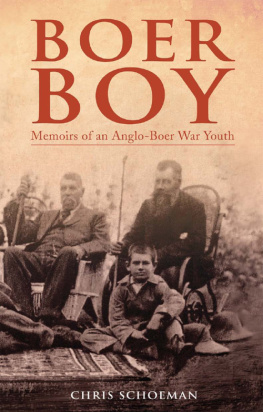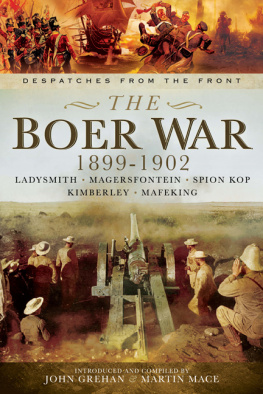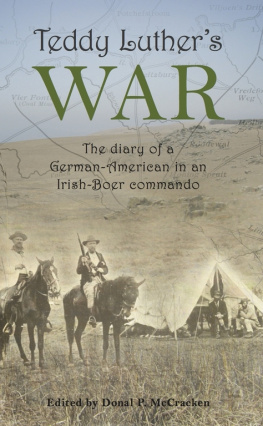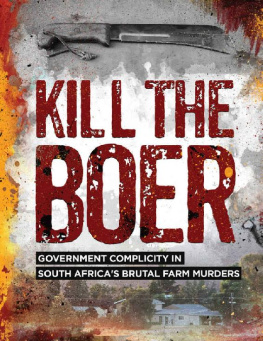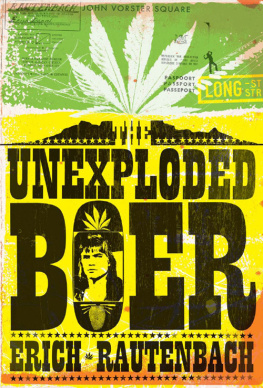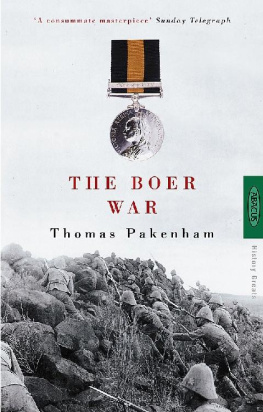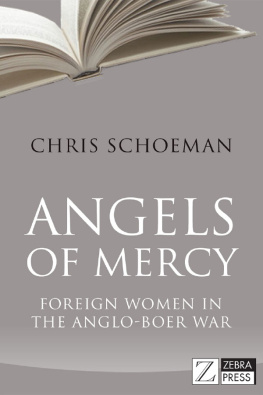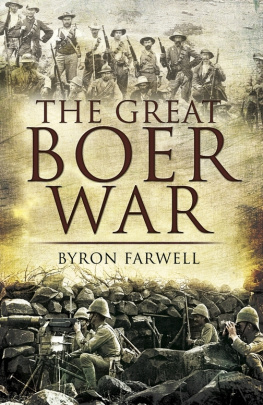BOER
BOY
Memoirs of an Anglo-Boer War Youth
CHRIS SCHOEMAN
Dedicated to the Du Preez family
Contents
Introduction
Published Boer diaries and memoirs of the Anglo-Boer War of 18991902 are numerous. Their authors range from figures in positions of high command, such as General Christiaan Rudolf de Wet (Three Years War), General Jan Christiaan Smuts (Memoirs of the Boer War), General Ben Bouwer (Memoirs of General Ben Bouwer) and General Pieter Hendrik Kritzinger (In die Skaduwee van die Dood), to ordinary burghers on commando with the Boers, including Deneys Reitz (Commando: A Boer Journal of the Boer War), Roland William Schikkerling (Commando Courageous: A Boers Diary) and Dietlof Siegfried van Warmelo (Mijn commando en guerilla commandoleven).
These are all accounts from people who could be regarded as grown men at the time of the war even someone like Deneys Reitz, who was only seventeen years old when war broke out. But, as far as could be ascertained from records in the Anglo-Boer War Museum in Bloemfontein, there are no published personal accounts from anyone who was as young as nine or ten years of age during the war. The author J.C. Steyn has, however, published the book Veg en Vlug, which contains reminiscences of people who were children at the time of the war. The recollections were extracted from articles that appeared in Die Huisgenoot magazine during the 1930s. There are also works of fiction about the so-called penkoppe, as the young Boer youths on commando were called, and a general work, Penkoppe van die Tweede Vryheidsoorlog 18991902, by Pets Marais. Boer Boy is therefore unique in the sense that it is the personal narrative of an individual, written some years after the war, documenting his war experiences as an eight-, nine- and ten-year-old boy on an eastern Free State farm, as well as in the prisoner-of-war camps at Umballa and Solon (also referred to as Solan) in faraway India.
Charles du Preez was born in November 1891 and turned eight just after the outbreak of war in October 1899. He celebrated his ninth birthday on the family farm, Suid-Wonderkop, and his tenth birthday while hiding with his father, Philip, from British troops in a mountain on the farm. After their capture by the British, they were sent to India as prisoners of war in spite of Charless young age. They initially spent some time in the prisoner-of-war camp at Umballa, but were later moved to a cooler climate to the camp at Solon, situated at the foot of the Himalayas. Although there were many young boys in the camps, Charles du Preez was, at just ten years of age, the youngest Boer boy in the camp at Solon at the time.
It is seldom that two members of the same family record their memoirs of a certain period or event, but both Charles du Preez, the Boer boy of this book, and his mother, Charlotte, wrote accounts of the events of the Anglo-Boer War. While both had lived on Suid-Wonderkop, in the eastern Free State, for a part of the war, Charles additionally experienced hiding from British soldiers in the mountain with his father and spending time in India as one of the youngest prisoners of war. His mother and younger brother and sisters were held captive in the concentration camp at Winburg, and the family was reunited only after the war.
A few months into the Anglo-Boer War, Charlotte decided to record the familys trials and tribulations during the war for her descendants. She started writing down, on a regular basis, her experiences on the farm and the ordeal of fleeing from the British. Her husband, Philip, had to leave for commando duty a few times before he was confined to the farm on British orders. Unfortunately, she lost some of the pages of her memoirs, but what remains is nevertheless a very valuable record of a Boer familys life during the Anglo-Boer War.
I am sure my descendants will be pleased to know what my experiences were during this sorrowful time, she wrote as a short introduction to her reminiscences. Therefore, I have decided to write something about it, so that they may read it in later years. It would be a good thing if every mother could record her experiences in commemoration of this bloody and unfair war. This war between English and Afrikaners, or Boers, as the enemy has called our heroes.
Shortly before Charlottes death in 1949, Reverend Henry Charles Hopkins, a grandson of Charlottes eldest brother and author of the biography of Commandant C.A. van Niekerk (Maar Een Soos Hy), visited Suid-Wonderkop, and Charlotte thought it well to donate the two manuscripts (hers and her sons) to him. In 1983, the reverend visited the farm again and returned the manuscripts to Charles du Preezs family. Charless nephew, Helgard du Preez, translated the manuscripts, which were written in Hollands-Afrikaans, into Afrikaans for use by the family. He also wrote additional texts on the family genealogy, aspects of the early history of the area and farming at Suid-Wonderkop.
During the 1960s, a tape-recorded interview with Charles about his Boer War experiences was made by his daughter, Estelle Lombaard. By then Charles was in his seventies, but still quite sharp and still farming at the farm The Willows, situated two kilometres east of Suid-Wonderkop. This recording was kindly made available to me to transcribe for use in this book. Broadly speaking, the written manuscript and the tape recording of Charles du Preez are similar, but there are many facts mentioned in the recording that are not mentioned in the manuscript, and vice versa. The two sources have, therefore, been used to supplement each other and to provide the fullest version of his reminiscences as possible. For the purposes of this book, the manuscripts and the recording have been translated into English, and Charless written and recorded words are printed in a different font with a ragged margin.
Unfortunately, little is known of Charless fathers life on commando. An interesting letter written by him to his wife, sent from the prisoner-of-war camp at Solon in India, has survived, however, and is preserved in the Anglo-Boer War Museum in Bloemfontein.
A history of the Du Preez family in South Africa was published in 1962 under the title Du Preez Gedenkboek. At the time, a family reunion was held in Paarl, where Charles spoke about his war experiences. Relatives of Charless still living in Wonderkop, Ficksburg and Bloemfontein, especially his nephew Helgard du Preez, his daughters Charlotte-Anne van Niekerk and Estelle Lombaard, and his grandson Dupr Lombaard of Plettenberg Bay, have been very helpful in providing additional information on Charles and earlier life at Suid-Wonderkop.
To add further perspective to these written and oral memoirs, extracts from diaries, letters and books on the Anglo-Boer War relating to events in the specific eastern Free State area have also been used. For example, letters of Margaret Marquard, General De Wets account of the Anglo-Boer War, Three Years War, is in itself a valuable source of insight into events that occurred in the eastern Free State.
Prisoner-of-war diaries helped to provide a more complete picture of life in the prisoner-of-war camps in India, especially that of Jan Geldenhuys (in the form of a manuscript in the Anglo-Boer War Museum in Bloemfontein) and those of Stephanus Francois Hugo (

